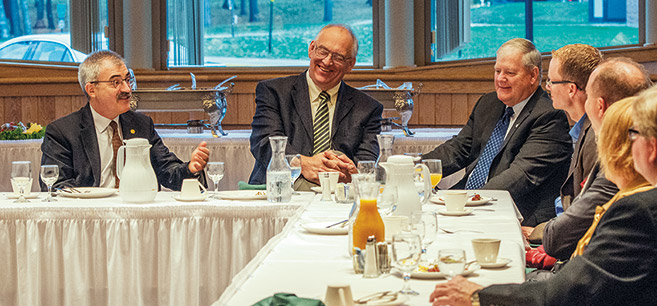
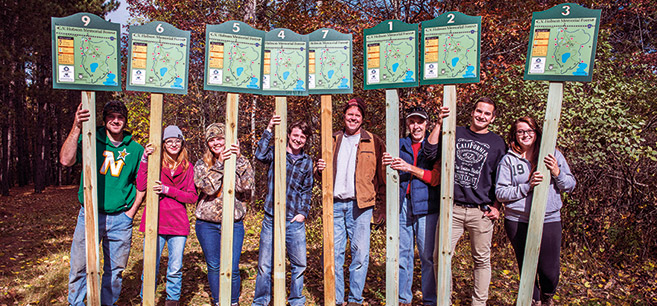
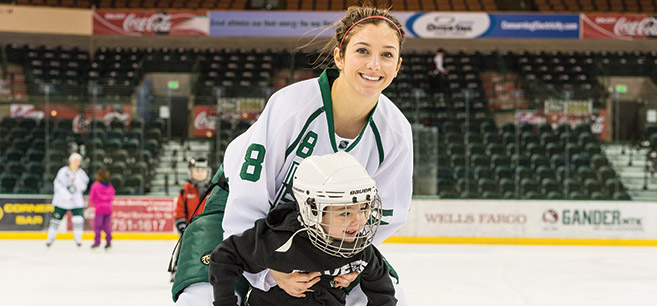
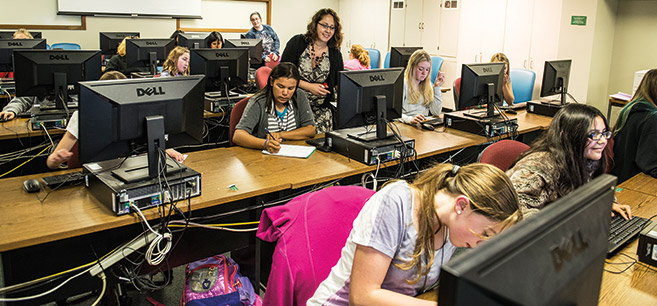
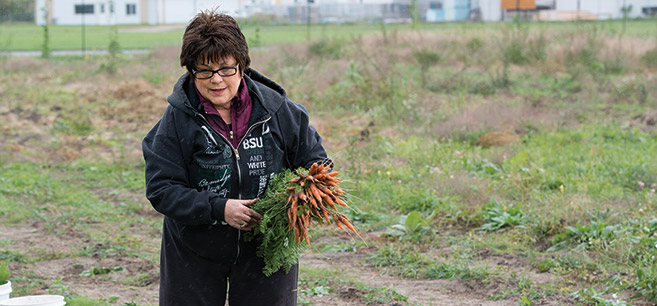
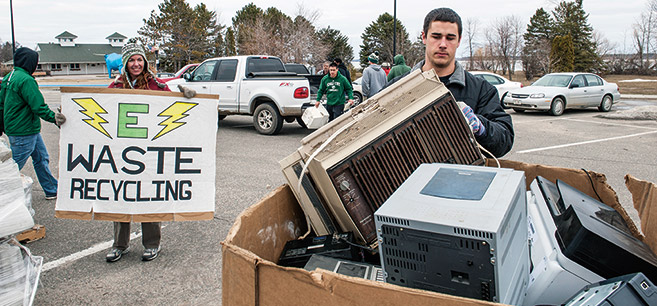
Outreach efforts grow in scope and importance
In partnership with a cross-country ski club, Bemidji State University students in October installed new signs at BSU’s Hobson Memorial Forest to mark seven kilometers of trails remapped in March by fellow students.
Also in October, a computer programmer at the university convened Minnesota’s first chapter of Girls Who Code, a nationwide organization that cultivates interest and aptitude in computing among middle and high school girls.
Throughout the fall semester, students in a sociology course have taken turns tending a community garden and participating in other food-supply initiatives.
All these activities exemplify a growing priority for Bemidji State: engagement by faculty, staff and students in and with the greater community to foster education, collaboration and service.
Along with pride in yearly events that bring people to campus, such as Community Appreciation Day, the high school mathematics contest and the Madrigal Dinners, outreach and hands-on learning are increasingly prized.
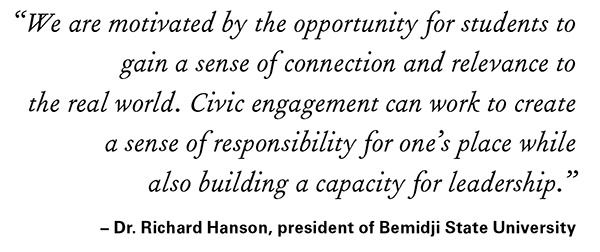 “We are motivated by the opportunity for students to gain a sense of connection and relevance to the real world,” President Richard Hanson said. “Civic engagement can work to create a sense of responsibility for one’s place while also building a capacity for leadership.”
“We are motivated by the opportunity for students to gain a sense of connection and relevance to the real world,” President Richard Hanson said. “Civic engagement can work to create a sense of responsibility for one’s place while also building a capacity for leadership.”
Bemidji State is actively involved in multiple projects, ranging from a downtown fine arts center that will showcase BSU artwork to a public-private student housing development planned for the former Bemidji High School site. Another example is Intern Bemidji, launched with the Bemidji Area Chamber of Commerce to connect students with employer needs.
In addition, BSU administrators are at the table on efforts to grow the regional economy by developing the highly skilled workforce that employers require. This connection was highlighted Oct. 1 when Chancellor Steven Rosenstone of the Minnesota State Colleges and Universities system began a one-day Bemidji visit by stressing the importance of community engagement over breakfast with local leaders.
“None of us can get it done by ourselves,” Rosenstone said. “We have to do this together. Nothing less than the future of our state hinges on our success.”
Lori Paris, president of the Bemidji Chamber, told him that has happened in and around Bemidji.
“I think all of us around the table would agree that Bemidji has been very good the past couple of years in developing partnerships and in saying we can move miles when we work together,” Paris said.
Serving the region is fundamental to the role of a public university like BSU, said Dr. Martin Tadlock, provost and vice president for academic affairs.
The relationships are multifaceted and growing, he said – as joyful as inviting children to skate with BSU hockey players and as ambitious as a planned off-campus Center for Community Partnerships that will coordinate the expanding interaction.
“The university is a lot more visible in the community than it used to be,” said Tadlock, who returned to BSU in 2012 after previously serving as a dean from 2001 to 2006.
Typically, campus-community collaboration develops over time, as educators see ways to connect student learning with local needs.
Such was the case with students’ work on new trail signage at Hobson Forest and two other trail networks maintained by the Bemidji Cross-Country Ski Club, a project that began to take shape in 2013 through conversations between BSU faculty and the club.
“The courses needed new signage,” said Dr. Patrick Donnay, a professor of political science who also serves as secretary of the club. “We’re using the partnership between BSU and the ski club to make it happen.”
Last winter, several geography students on snowshoes used GPS navigation to trace the exact route of the Hobson trails. Funding for the signs was provided by the ski club, BSU’s Outdoor Program Center and the BSU Sustainability Office. The new signs were designed and produced in Bemidji.
For BSU programmer Jennifer Theisen, who sparked creation of Northern Minnesota’s Girls Who Code, the idea to involve the university in such an effort was sparked by a tech industry email group she follows – and by her own experience in a field that is still male-dominated.
“I’d never heard about (Girls Who Code), and I saw this tiny little ad in the email and went, ‘Wow, that sounds like something I’d be interested in,’” Theisen recalled. “I’ve been in the computing field as a professional since the age of 19, and being a female, and a young female at that, was kind of hard. I had to take an assertive stance in order to make my way.”
Her interest in the national effort to develop girls’ talents at computing coincided with a BSU performance review that challenged her to think about her goals. A native of Hibbing, she recognized the need for such an initiative in rural Minnesota.
With the blessing of her bosses, Theisen connected with the group’s national staff, explained the socioeconomic challenges of the Bemidji region and followed steps to organize a club, including a background check and test of her own programming expertise.
In July she learned her application to form a Girls Who Code chapter had been accepted, and she began meeting with area school superintendents, principals and teachers to help her recruit girl participants. About 35 girls are now meeting weekly on the BSU campus, including a contingent that travels by bus from Red Lake and Ponemah.
Theisen said she believes the program will not only benefit the girls but also help develop talent to build the region’s economy.
“This is going to start the girls off earlier to get the knowledge to be able to apply for the jobs that we have here – to start here and stay here,” she said.
Another recent BSU outreach effort that addresses a community need is a new sociology course called Social Movements and Change, developed by Dr. Carla Norris-Raynbird. The course combines service learning through hands-on experience with in-class study of how social movements begin and evolve.
Norris-Raynbird’s students, not all of them sociology majors, have been working side-by-side this fall with people in the community on grass-roots initiatives to increase the availability of food for those in need.
“Students experience the real-life application of the theory and concepts learned in the classroom and accomplish their service learning in a concerted effort – as a group,” Norris-Raynbird said.
Divided into several small groups, students have worked in the garden at the Bemidji Community Food Shelf and learned about such things as beekeeping and composting through Rail River Folk School and visiting the Harmony Natural Foods Co-op, both in Bemidji.
In class, the students are analyzing their group interaction, comparing notes with other groups and applying all of that to the larger subject of social movements.
“It’s one thing to read about social movements,” said one of the students, senior Jodi Rubio of Park Rapids, “but actually going out into the community and learning about an issue in Bemidji has made me more interested in food justice.”
Learning comes by doing
The concept of problem-based learning – tackling a community issue or need – has been central to the work of BSU’s Sustainability Office, under the leadership of coordinator Erika Bailey-Johnson.
Students employed by the office, as well as members of an organization called Students for the Environment, have been involved in such efforts as the Nice Ride bicycle-sharing program, collection of electronic waste for recycling and taking unwanted household items from Goodwill for free distribution via the Bemidji Community Food Shelf.
“We talk about what we need to do to change a situation, to make it more sustainable, and what are the barriers,” Bailey-Johnson said. “In the process, they’re learning problem-solving skills, project-management skills, leadership skills and communication skills.”
Those learning experiences, combined with a desire to improve the quality of life throughout the Bemidji region, drive Bemidji State’s increased commitment to civic and community engagement.
The importance of those efforts is underscored in the university’s draft Strategic Plan for 2014-2017. One of its six major strategies is called “Connect to Our Communities, which calls for “students, faculty and staff to engage and connect with our constituents and the many communities we serve through service learning, internships, mentorships, community advocacy, field experiences, class projects and practicums.”
Hanson said those community interactions are linked to connections that extend to the state and national levels and beyond.
“There is little doubt that the world is increasingly global and interconnected,” he said. “Therefore, Bemidji State University needs to make sure its commitment to civic relevance is rock solid.”
